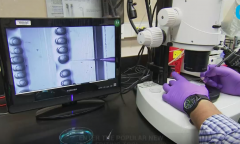By Prei Dy, | June 06, 2017

A team of researchers wants to develop a too using CRISPR gene-editing technology l to detect Parkinson's disease. (YouTube)
A team of researchers from Florida wants to develop a new screening tool for Parkinson's disease using the CRISPR Cas9 gene-editing technology, a crucial step to identifying new drug therapies for the degenerative disorder of the nervous system.
The technology allows scientists to assess and monitor a brain protein called alpha-synuclein that has been linked to Parkinson's disease, which affects motor functions caused by a gradual loss of brain cells.
Like Us on Facebook
"It's the most powerful and widely used gene-editing technique in use because it allows us to change the DNA in living cells," Associate Professor Yoon-Seong Kim said. "The innovation of this method is that it enables us to monitor this gene in real-time without killing the cell. Without the CRISP Cas-9 method, you would have to extract all the proteins from the cell to measure them, which kills the cell."
The team edited the alpha-synuclein gene using the CRISPR technique and inserted a luminescent tag made from proteins that allows fireflies to give off light. When the cell creates alpha-synuclein protein, the tag lights up.
"More light means an increased level of alpha-synuclein, which would be considered a diseased state," Levi Adams, one of the lead researchers, said.
"If we take one of these modified cells and treat it with a particular drug, if it doesn't produce light anymore, then this means the drug is a potential treatment for the disease," Sambuddha Basu, one of the researchers, said.
The easy and convenient light production process will allow researchers to perform high throughput screening and test a variety of drugs at once. Scientists also hope to identify other potential ways to reduce the production of alpha-synuclein, which could possibly prevent the development or progression of Parkinson's disease.
The findings of the study have been published in the journal Scientific Reports.
-
Use of Coronavirus Pandemic Drones Raises Privacy Concerns: Drones Spread Fear, Local Officials Say

-
Coronavirus Hampers The Delivery Of Lockheed Martin F-35 Stealth Fighters For 2020

-
Instagram Speeds Up Plans to Add Account Memorialization Feature Due to COVID-19 Deaths

-
NASA: Perseverance Plans to Bring 'Mars Rock' to Earth in 2031

-
600 Dead And 3,000 In The Hospital as Iranians Believed Drinking High-Concentrations of Alcohol Can Cure The Coronavirus

-
600 Dead And 3,000 In The Hospital as Iranians Believed Drinking High-Concentrations of Alcohol Can Cure The Coronavirus

-
COVID-19: Doctors, Nurses Use Virtual Reality to Learn New Skills in Treating Coronavirus Patients












